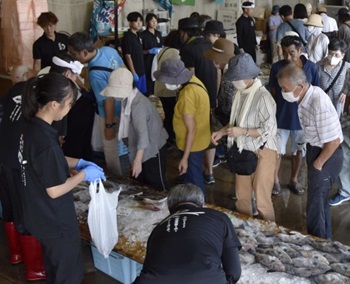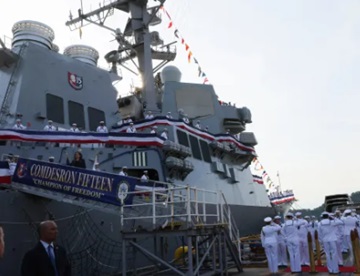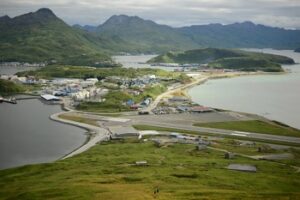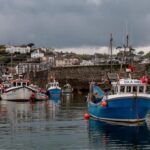Tag Archives: Japan
N.B.’s favourite seafood threatened by Trump: lobster industry
 Fishermen would be forced to swallow a depressed price for their catch and processors would have a lot less work, shaking up a commercial enterprise that employs about 5,000 New Brunswickers on boats and another 5,000 in seafood plants. Behind the scenes, the lobster lobby is working feverishly to convince officials in the White House administration and other top Republican officials that imposing a 25 per cent tariff on seafood would be a big mistake for American consumers already reeling from the higher cost of living. The lobster market has long been deeply integrated between Canada and the United States and would be badly wounded by a trade war between the two nations. more, >>CLICK TO READ<< 19:53
Fishermen would be forced to swallow a depressed price for their catch and processors would have a lot less work, shaking up a commercial enterprise that employs about 5,000 New Brunswickers on boats and another 5,000 in seafood plants. Behind the scenes, the lobster lobby is working feverishly to convince officials in the White House administration and other top Republican officials that imposing a 25 per cent tariff on seafood would be a big mistake for American consumers already reeling from the higher cost of living. The lobster market has long been deeply integrated between Canada and the United States and would be badly wounded by a trade war between the two nations. more, >>CLICK TO READ<< 19:53
That’s a lot of sushi: Tuna weighing as much as a grizzly bear sells for $1.3M in Japan
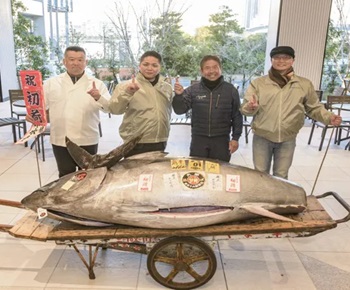 A bluefin tuna sold for $1.3 million at a predawn auction in Tokyo on Sunday morning, making it one of the most expensive tuna to be sold in the history of sushi. The 608-pound fish, equivalent in weight to a typical male grizzly bear, was caught off the coast of Oma in northern Japan’s Aomori prefecture on Saturday morning, according to Japan’s Kyodo News agency. The fish was sold to a Michelin-starred Japanese sushi restaurant chain for 207 million yen, the Onodera Group said in a statement about its winning bid. The first auction of the year at Tokyo’s Toyosu Market – one of the world’s largest wholesale fish markets – typically reels in eye-watering prices. more, >>CLICK TO READ<< 07:45
A bluefin tuna sold for $1.3 million at a predawn auction in Tokyo on Sunday morning, making it one of the most expensive tuna to be sold in the history of sushi. The 608-pound fish, equivalent in weight to a typical male grizzly bear, was caught off the coast of Oma in northern Japan’s Aomori prefecture on Saturday morning, according to Japan’s Kyodo News agency. The fish was sold to a Michelin-starred Japanese sushi restaurant chain for 207 million yen, the Onodera Group said in a statement about its winning bid. The first auction of the year at Tokyo’s Toyosu Market – one of the world’s largest wholesale fish markets – typically reels in eye-watering prices. more, >>CLICK TO READ<< 07:45
In the Pacific Northwest, killing sea lions is a necessity
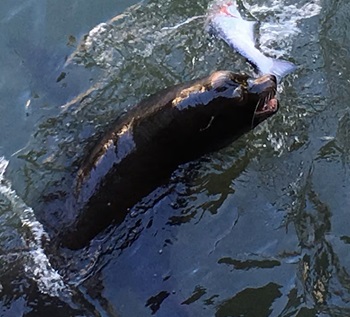 Don’t let their adorable faces and playful personalities fool you: California and Steller sea lions are capable of having disastrous impacts on nonnative ecosystems. In places like the Columbia River Gorge, these so-called dogs of the sea have been encroaching on native fish habitats for decades. Making homes in the Pacific, in coastal areas like the beaches of California, Alaska and Japan, these sea lions especially thrive on the West Coast, where population numbers are estimated to have grown from 75,000 to 257,000 in the last 30 years. This population boom has meant increased nutritional needs, sending thousands of sea lions inland in search of prey. One of the easiest targets for sea lions is the Columbia River, one of North America’s largest rivers and a key migration route for North American fish. The picturesque river valley abounds with seafood, including 13 federally protected species. more, >>CLICK TO READ<< 10:12
Don’t let their adorable faces and playful personalities fool you: California and Steller sea lions are capable of having disastrous impacts on nonnative ecosystems. In places like the Columbia River Gorge, these so-called dogs of the sea have been encroaching on native fish habitats for decades. Making homes in the Pacific, in coastal areas like the beaches of California, Alaska and Japan, these sea lions especially thrive on the West Coast, where population numbers are estimated to have grown from 75,000 to 257,000 in the last 30 years. This population boom has meant increased nutritional needs, sending thousands of sea lions inland in search of prey. One of the easiest targets for sea lions is the Columbia River, one of North America’s largest rivers and a key migration route for North American fish. The picturesque river valley abounds with seafood, including 13 federally protected species. more, >>CLICK TO READ<< 10:12
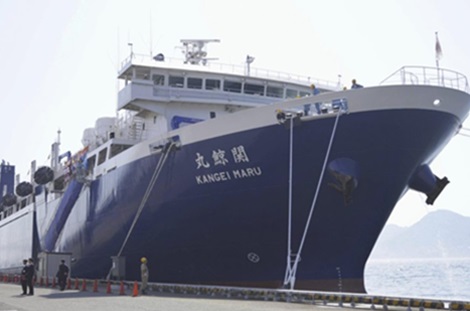
Fresh fin whale meat is auctioned for the first time in decades in Japan
Meat from fin whales caught for the first time in nearly 50 years off Japan’s northern coast fetched up to more than $1,300 per kilogram (2.2 lbs) at auction Thursday, as officials try to keep the struggling industry alive. Japan’s Fisheries Agency this year added fin whales to its list of three whale species that can be legally hunted as the country expands commercial whaling along its coast. Japan resumed commercial whaling within its exclusive economic zone after withdrawing from the International Whaling Commission in 2019. The IWC designated the fin whale as a species for protection from overhunting in 1976. On Thursday, some 1.4 tons of fresh meat from several fin whales caught off Japan’s northern main island of Hokkaido was auctioned at the Sapporo fish market and the Kangei Maru’s home port of Shimonoseki. more, >>CLICK TO READ<< 08:21
Maine’s mysterious floating wind research
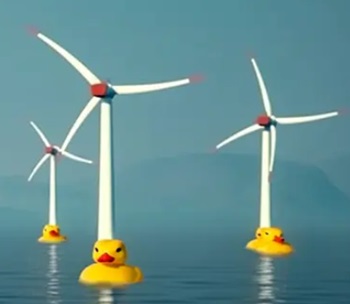 The State of Maine just got a very strange offshore wind lease from the Feds. They call it a research lease as opposed to a commercial development lease. It has some mysterious features that are worth pondering. There may even be a many billion-dollar trick here. We consider that at the end, after briefly explaining the mysteries. To begin with, the lease is for a 144 MW “research array” of turbines, as it is called. Well, 144 MW is huge for research. The South Fork Wind site (fixed, not floating) that is already running is a 12-turbine, 132 MW commercial facility, so this array will be bigger than commercial. It could cost $3 billion-plus the cost of the factory to make the dozen or so floaters. Different websites suggest different turbine sizes from 10 to 12 MW. Of course, if this is really research, they might use a variety of sizes, but the total is still huge. more, >>CLICK TO READ<< 12:14
The State of Maine just got a very strange offshore wind lease from the Feds. They call it a research lease as opposed to a commercial development lease. It has some mysterious features that are worth pondering. There may even be a many billion-dollar trick here. We consider that at the end, after briefly explaining the mysteries. To begin with, the lease is for a 144 MW “research array” of turbines, as it is called. Well, 144 MW is huge for research. The South Fork Wind site (fixed, not floating) that is already running is a 12-turbine, 132 MW commercial facility, so this array will be bigger than commercial. It could cost $3 billion-plus the cost of the factory to make the dozen or so floaters. Different websites suggest different turbine sizes from 10 to 12 MW. Of course, if this is really research, they might use a variety of sizes, but the total is still huge. more, >>CLICK TO READ<< 12:14
UK fishermen ‘at the very bottom of the heap’
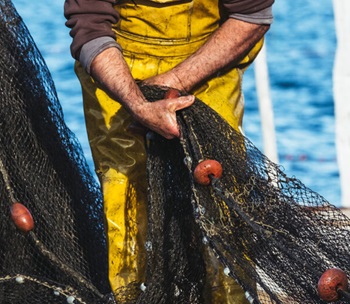 A paper published in the scientific journal Marine Policy, with a wide group of authors, some attached to anti-fishing NGOs, shows starkly how bad a deal UK fishermen have in Europe. The UK EEZ is a key fishing ground for fleets from the EU and Norway, which are provided with huge amounts of government support to fish in British and, to a lesser extent, Irish waters. Ireland is the only country remaining within the EU that is a net ‘subsidy sink’, with vessels fishing what would be the Irish EEZ – were Ireland independent – receiving more financial support to fish there than the Irish fleet itself receives. But the figures for Ireland are dwarfed by those for the UK, which, the study says, is an ‘outlier’ worldwide. There is otherwise a pattern of richer nations – in particular China, Spain, Korea, Japan and the USA – being given support to extract fish from much poorer developing countries. The paper doesn’t attempt to explain quite why the UK is such an outlier. more, >>CLICK TO READ<< 10:29
A paper published in the scientific journal Marine Policy, with a wide group of authors, some attached to anti-fishing NGOs, shows starkly how bad a deal UK fishermen have in Europe. The UK EEZ is a key fishing ground for fleets from the EU and Norway, which are provided with huge amounts of government support to fish in British and, to a lesser extent, Irish waters. Ireland is the only country remaining within the EU that is a net ‘subsidy sink’, with vessels fishing what would be the Irish EEZ – were Ireland independent – receiving more financial support to fish there than the Irish fleet itself receives. But the figures for Ireland are dwarfed by those for the UK, which, the study says, is an ‘outlier’ worldwide. There is otherwise a pattern of richer nations – in particular China, Spain, Korea, Japan and the USA – being given support to extract fish from much poorer developing countries. The paper doesn’t attempt to explain quite why the UK is such an outlier. more, >>CLICK TO READ<< 10:29
First Nations advocates resolve to put traditional fishing rights under international spotlight
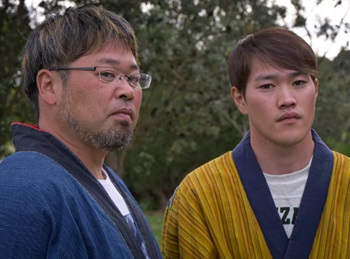 First Nations delegates from Japan, Taiwan, Canada, Alaska, and Australia have met on the lands of Walbunga Yuin people on the NSW far south coast for the International Indigenous Fishing Symposium. Indigenous fishing rights activists in NSW are working with First Nations groups around the world to put a global spotlight on the battle to protect traditional fishing rights and cultural practices. The groups plan to work together to lobby the United Nations. more, >>CLICK TO READ<< 07:56
First Nations delegates from Japan, Taiwan, Canada, Alaska, and Australia have met on the lands of Walbunga Yuin people on the NSW far south coast for the International Indigenous Fishing Symposium. Indigenous fishing rights activists in NSW are working with First Nations groups around the world to put a global spotlight on the battle to protect traditional fishing rights and cultural practices. The groups plan to work together to lobby the United Nations. more, >>CLICK TO READ<< 07:56
Rare ‘football fish’ washes up near Cannon Beach
 A deep-sea angler fish, called a Pacific football fish (Himantoliphus sagamius) has been found by local beachcombers just south of Cannon Beach. Living in complete darkness, at 2,000 to 3,300 feet, these fish are rarely seen. In fact, only 31 specimens have been recorded around the world. While a handful of football fish have been recorded in New Zealand, Japan, Russia, Hawaii, Ecuador, Chile and California, this is the first one reported on the Oregon Coast to the knowledge of personnel at Seaside Aquarium, who announced the find. Photos, more, >>CLICK TO READ<< 10:38
A deep-sea angler fish, called a Pacific football fish (Himantoliphus sagamius) has been found by local beachcombers just south of Cannon Beach. Living in complete darkness, at 2,000 to 3,300 feet, these fish are rarely seen. In fact, only 31 specimens have been recorded around the world. While a handful of football fish have been recorded in New Zealand, Japan, Russia, Hawaii, Ecuador, Chile and California, this is the first one reported on the Oregon Coast to the knowledge of personnel at Seaside Aquarium, who announced the find. Photos, more, >>CLICK TO READ<< 10:38
Japan Fisheries Agency proposes allowing commercial catching of fin whales
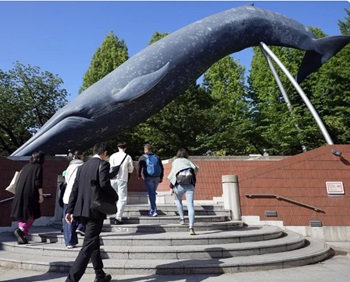 Japan’s Fisheries Agency on Thursday proposed a plan to allow catching fin whales in addition to three smaller whale species currently permitted under the country’s commercial whaling around its coasts. Chief Cabinet Secretary Yoshimasa Hayashi, whose electoral district is traditionally known for whaling, said his government supports sustainable use of whales as part of Japan’s traditional food culture and plans to promote the industry. “Whales are important food resources and we believe they should be sustainably utilized just like any other marine resources, based on scientific evidence,” Hayashi told reporters. “It is also important to inherit Japan’s traditional food culture.” more, >>CLICK TO READ<< 11:11
Japan’s Fisheries Agency on Thursday proposed a plan to allow catching fin whales in addition to three smaller whale species currently permitted under the country’s commercial whaling around its coasts. Chief Cabinet Secretary Yoshimasa Hayashi, whose electoral district is traditionally known for whaling, said his government supports sustainable use of whales as part of Japan’s traditional food culture and plans to promote the industry. “Whales are important food resources and we believe they should be sustainably utilized just like any other marine resources, based on scientific evidence,” Hayashi told reporters. “It is also important to inherit Japan’s traditional food culture.” more, >>CLICK TO READ<< 11:11
Rescue Operation Saves 24 on Sinking Ship in Japan, One Fatality Confirmed
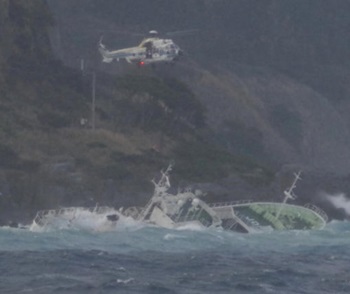 During an intense rescue mission amid turbulent seas off the southwest coast of Tokyo, a Japanese coast guard helicopter successfully retrieved 24 fishermen from a perilous situation where they were holding onto a nearly capsized ship. The incident, which occurred on Monday morning near an island chain, unfortunately also involved a fatality when one crew member was recovered deceased after being cast into the sea. The vessel, identified as Fukuei Maru No. 8, experienced engine trouble on Sunday evening in the Pacific Ocean while on route from Yaizu Port in central Japan to South America for a tuna-fishing expedition. About five hours after departure, the ship began to drift due to the stormy conditions, prompting the captain to send out a distress call reporting that the ship had struck rocks, as stated by the coast guard. Video, more, >>click to read<< 06:57
During an intense rescue mission amid turbulent seas off the southwest coast of Tokyo, a Japanese coast guard helicopter successfully retrieved 24 fishermen from a perilous situation where they were holding onto a nearly capsized ship. The incident, which occurred on Monday morning near an island chain, unfortunately also involved a fatality when one crew member was recovered deceased after being cast into the sea. The vessel, identified as Fukuei Maru No. 8, experienced engine trouble on Sunday evening in the Pacific Ocean while on route from Yaizu Port in central Japan to South America for a tuna-fishing expedition. About five hours after departure, the ship began to drift due to the stormy conditions, prompting the captain to send out a distress call reporting that the ship had struck rocks, as stated by the coast guard. Video, more, >>click to read<< 06:57
Massive bluefin tuna weighing more than 500 pounds reels in almost $800,000 at Tokyo auction
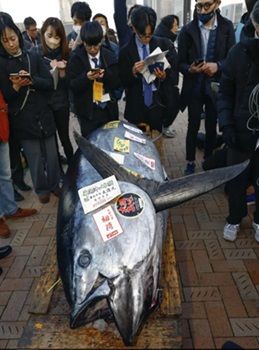 The most expensive piece of seafood at Tokyo’s largest fish market sold for a ton-a money at auction on the opening day of business. The mammoth bluefin tuna weighing nearly 525 pounds was purchased by seafood wholesaler Yamayuki and a sushi chain for nearly $800,000. Yamayuki and sushi chain Onodera group have purchased the market’s priciest fish of the new season for four years running. “If we were going to do it, we wanted to win,” Yamayuki president Yukitaka Yamaguchi told a throng of reporters that had assembled upon the auction’s conclusion. Video, photos, >>click to read<< 09:08
The most expensive piece of seafood at Tokyo’s largest fish market sold for a ton-a money at auction on the opening day of business. The mammoth bluefin tuna weighing nearly 525 pounds was purchased by seafood wholesaler Yamayuki and a sushi chain for nearly $800,000. Yamayuki and sushi chain Onodera group have purchased the market’s priciest fish of the new season for four years running. “If we were going to do it, we wanted to win,” Yamayuki president Yukitaka Yamaguchi told a throng of reporters that had assembled upon the auction’s conclusion. Video, photos, >>click to read<< 09:08
Port in Tottori striving to save commercial coastal fishing
One of Japan’s prominent fishing ports and a frequent stop for foreign luxury cruise liners, the city of Sakaiminato on the Sea of Japan coast bolsters the local economy in a remote western region of the country. Also thriving as a trading base after Japan opened up the country in the mid-19th century thanks to its relative proximity to the Korean Peninsula, the Tottori Prefecture city with a population of 33,000 is dubbed a “fishing town” for being a good natural port endowed by rich fishing banks in adjacent waters. This has historically provided the solid foundation for the prosperity of the offshore fishing operation based in Sakaiminato, where efforts are now being made to keep aloft its coastal fishing — the other main style of commercial fishing that has helped feed the city. more, >>click to read<< 13:23
Single Snow Crab Gets Auctioned for Record 10 Million Yen in Japan
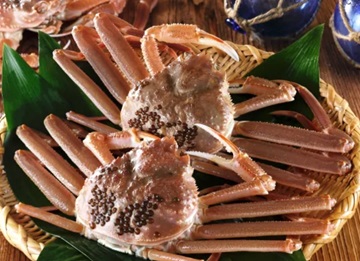 Snow crab season in Japan kicked off with a record auction this week, after a single 1.2-kilogram snow crab sold for an incredible 10 million yen (about $66,000 USD) at the Hamasaka fishing port in the coastal town of Shinonsen. The crab was a highly sought-after “matsuba-gani,” which refers to male snow crabs that are found in the Sanin region along the south-western coast of Japan’s main island Honshu. The lucky buyer was restaurant owner Ryosuke Uemura, 47, proprietor of the Ryouriya Uemura restaurant in the Chuo Ward of Kobe, who placed the winning bid on Nov 6., the first day of snow crab season.”I wanted to get one on day one, no matter what. >>click to read<< 07:45
Snow crab season in Japan kicked off with a record auction this week, after a single 1.2-kilogram snow crab sold for an incredible 10 million yen (about $66,000 USD) at the Hamasaka fishing port in the coastal town of Shinonsen. The crab was a highly sought-after “matsuba-gani,” which refers to male snow crabs that are found in the Sanin region along the south-western coast of Japan’s main island Honshu. The lucky buyer was restaurant owner Ryosuke Uemura, 47, proprietor of the Ryouriya Uemura restaurant in the Chuo Ward of Kobe, who placed the winning bid on Nov 6., the first day of snow crab season.”I wanted to get one on day one, no matter what. >>click to read<< 07:45
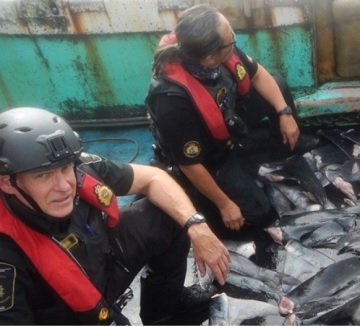
DFO says thousands of illegal shark fins found during Pacific patrol
Canadian fisheries officers discovered more than 3,000 shark fins while conducting a maritime surveillance and enforcement mission in the North Pacific Ocean, according to Fisheries and Oceans Canada. The agency says the fins were illegally possessed or stored on multiple vessels that were inspected during a two-month patrol of the high seas between British Columbia and Japan. Some of the fins were from threatened species, including the oceanic whitetip shark, the DFO said in news 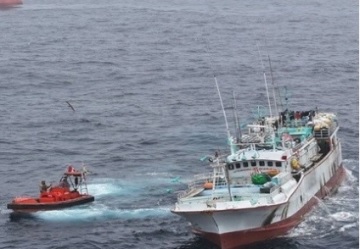 release Thursday. The annual enforcement mission, known as Operation North Pacific Guard, included fishery and coast guard officers from the United States and Japan, as well as a Canadian patrol aircraft temporarily based out of Japan. >>click to read << 16:21
release Thursday. The annual enforcement mission, known as Operation North Pacific Guard, included fishery and coast guard officers from the United States and Japan, as well as a Canadian patrol aircraft temporarily based out of Japan. >>click to read << 16:21
Fukushima sake brewer warms shattered Japanese fishing community
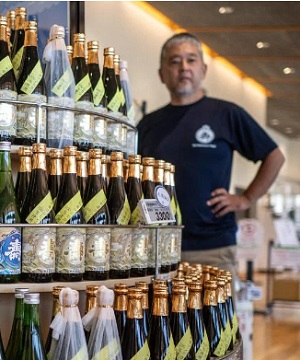 Daisuke Suzuki is helping by doing what he does best as life tentatively returns to normal for the devastated fishing communities of Japan’s Fukushima region: making sake. The “toji” sake master and his family were lucky to escape with their lives when a huge earthquake and tsunami devastated the area in March 2011, killing about 18,000 people and knocking out the nearby nuclear plant. In the town of Namie, the disaster obliterated the old port of Ukedo and its local fishing industry, as well as the Iwaki Kotobuki sake brewery that Suzuki’s family has owned for five generations. For two centuries, at least, it had made the rice wine that revived many a fisherman’s spirits after returning to port from the capricious Pacific Ocean with a hold brimming with fish. They would drink cups of Iwaki Kotobuki sake over white-meat sashimi of flounder and bass, delicacies from the Fukushima coast. “The sake was always there, just like the fish,” said one taciturn local fisherman, not wishing to be identified. “That is the way it has been here since my childhood.” Two years ago, the government gave the all-clear for the sale of fish from the Fukushima region to resume. The fisherman needed something to drink, and Suzuki then built a new sake plant back in Namie. >>click to read<< 15:42
Daisuke Suzuki is helping by doing what he does best as life tentatively returns to normal for the devastated fishing communities of Japan’s Fukushima region: making sake. The “toji” sake master and his family were lucky to escape with their lives when a huge earthquake and tsunami devastated the area in March 2011, killing about 18,000 people and knocking out the nearby nuclear plant. In the town of Namie, the disaster obliterated the old port of Ukedo and its local fishing industry, as well as the Iwaki Kotobuki sake brewery that Suzuki’s family has owned for five generations. For two centuries, at least, it had made the rice wine that revived many a fisherman’s spirits after returning to port from the capricious Pacific Ocean with a hold brimming with fish. They would drink cups of Iwaki Kotobuki sake over white-meat sashimi of flounder and bass, delicacies from the Fukushima coast. “The sake was always there, just like the fish,” said one taciturn local fisherman, not wishing to be identified. “That is the way it has been here since my childhood.” Two years ago, the government gave the all-clear for the sale of fish from the Fukushima region to resume. The fisherman needed something to drink, and Suzuki then built a new sake plant back in Namie. >>click to read<< 15:42
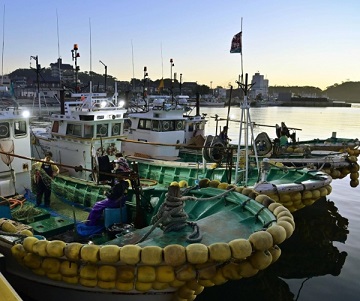
Japan boosts fishing sector aid after Fukushima water release
The announcement came as more than 100 fishermen and locals living near Fukushima Prefecture were to file a lawsuit this week seeking to stop the discharge. The ¥20.7 billion ($141 million) in additional funding announced by Prime Minister Fumio Kishida comes on top of an existing ¥80 billion aimed at minimizing reputational damage to the industry and keeping businesses afloat. The beefed-up aid now totaling ¥100.7 billion is a reflection of the government’s “determination to protect” a sector already scarred by the 2011 nuclear catastrophe in Fukushima, Kishida said. >>click to read<< 11:24
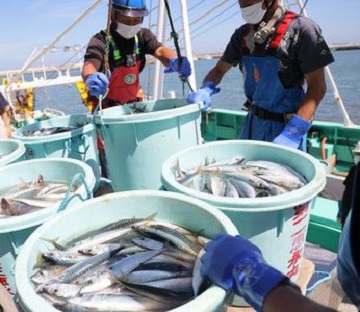
Trawl Fishing Resumes off Fukushima amid N-Plant Water Release
The offshore trawl fishing season kicked off in the northeastern Japan prefecture of Fukushima on Friday, about a week after the country began discharging treated wastewater from the Fukushima No. 1 nuclear power plant. Some 20 fishing vessels left Matsukawaura port in the city of Soma early in the morning. They began returning to the port from before noon for fish landings and auctions. “It’s regrettable we have to resume fishing while the treated water is being released, but I hope everyone will do their best,” Masahiro Kikuchi, vice head of the local Soma Futaba fisheries cooperative association, said at a departure ceremony held at the port from 1:30 a.m. >>click to read<< 12:18
Fukushima residents cautious after wrecked nuclear plant begins releasing treated wastewater
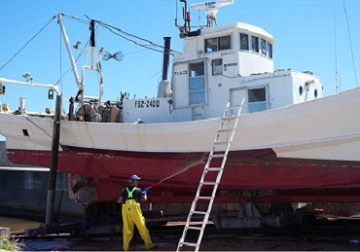 Fish auction prices at a port south of the Fukushima Daiichi nuclear power plant were mixed amid uncertainty over how seafood consumers will respond to the release of treated and diluted radioactive wastewater into the ocean. The plant, which was damaged in the 2011 earthquake and tsunami, began sending the treated water into the Pacific on Thursday despite protests at home and in nearby countries that are adding political and diplomatic pressures to the economic worries. The decades long release has been strongly opposed by fishing groups and criticized by neighboring countries. Japanese fishing groups fear the release will do more harm to the reputation of seafood from the Fukushima area. Photos, >click to read< 16:25
Fish auction prices at a port south of the Fukushima Daiichi nuclear power plant were mixed amid uncertainty over how seafood consumers will respond to the release of treated and diluted radioactive wastewater into the ocean. The plant, which was damaged in the 2011 earthquake and tsunami, began sending the treated water into the Pacific on Thursday despite protests at home and in nearby countries that are adding political and diplomatic pressures to the economic worries. The decades long release has been strongly opposed by fishing groups and criticized by neighboring countries. Japanese fishing groups fear the release will do more harm to the reputation of seafood from the Fukushima area. Photos, >click to read< 16:25
5 things to know about Japan’s Fukushima water release in the Pacific
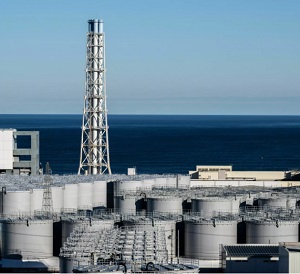 Workers in Japan have started releasing treated radioactive water from the Fukushima Daiichi nuclear power plant into the Pacific Ocean. The plant was destroyed in a 2011 earthquake and massive tsunami, and water has been accumulating ever since. On Thursday, the Chinese government announced it was immediately suspending aquatic imports, such as seafood, from Japan. A review by the UN’s nuclear watchdog says that the discharge will have a negligible radiological impact to people and the environment, but some nations remain concerned. Here’s what the Japanese government is doing, and why. >click to read< 09:12
Workers in Japan have started releasing treated radioactive water from the Fukushima Daiichi nuclear power plant into the Pacific Ocean. The plant was destroyed in a 2011 earthquake and massive tsunami, and water has been accumulating ever since. On Thursday, the Chinese government announced it was immediately suspending aquatic imports, such as seafood, from Japan. A review by the UN’s nuclear watchdog says that the discharge will have a negligible radiological impact to people and the environment, but some nations remain concerned. Here’s what the Japanese government is doing, and why. >click to read< 09:12
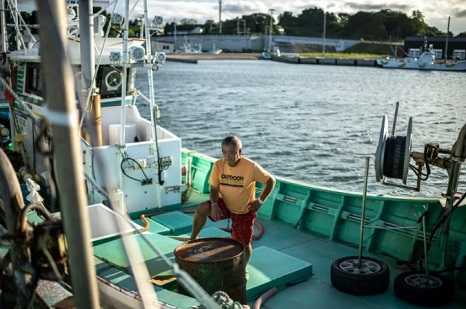
Water release finds little support in Fukushima
Most Fukushima fishermen are tight-lipped but Haruo Ono can’t keep his thoughts to himself on Japan’s plans to release treated cooling water from the stricken nearby nuclear power plant into the Pacific from Thursday. “Nothing about the water release is beneficial to us. There is no advantage for us. None. It’s all detrimental,” Ono, who lost his brother in the 2011 tsunami that crippled the plant, told AFP. “Fishermen are 100 percent against,” the 71-year-old said at his modest home in Shinchimachi, around 60 kilometres (40 miles) north of the nuclear plant in northeast Japan. “The sea is where we work. We make a living off of the sea, we’re at the mercy of the sea. So if we don’t protect the sea, who would?” >click to read< 07:43
Japan PM Fumio Kishida to meet fishermen on Fukushima water release plan
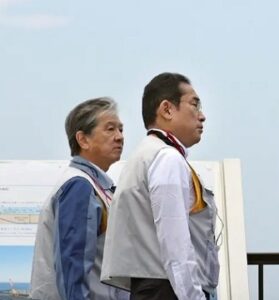 Japanese Prime Minister Fumio Kishida said he will meet fishermen as soon as Monday to seek their understanding of the government’s plan to release radioactive water from the wrecked Fukushima nuclear plant into the Pacific. Getting the tacit approval of organizations representing the fisherman is considered the final hurdle for the plan to release the treated waste water, a move the government says it wants to begin this summer. The plan to release 1.3 million tons of water from the tsunami-destroyed plant as Tokyo Electric Power (Tepco) runs out of storage space, has been opposed by local fishing unions, caused concern among shoppers in South Korea and sparked import bans of Fukushima food products China. >click to read< 09:00
Japanese Prime Minister Fumio Kishida said he will meet fishermen as soon as Monday to seek their understanding of the government’s plan to release radioactive water from the wrecked Fukushima nuclear plant into the Pacific. Getting the tacit approval of organizations representing the fisherman is considered the final hurdle for the plan to release the treated waste water, a move the government says it wants to begin this summer. The plan to release 1.3 million tons of water from the tsunami-destroyed plant as Tokyo Electric Power (Tepco) runs out of storage space, has been opposed by local fishing unions, caused concern among shoppers in South Korea and sparked import bans of Fukushima food products China. >click to read< 09:00
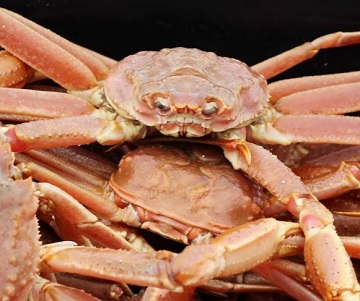
N.L. snow crab sales to Japan displaced by Russia
While many countries are imposing sanctions on Russia as a result of the war in Ukraine, Japan is taking advantage of low Russian snow crab prices. Clifford Small, MP for Coast of Bays-Central-Notre Dame and federal fisheries critic, says that is preventing Newfoundland and Labrador processors from selling their crab to Japan, as they normally do. “To have one of our major markets dry up on us, and to dry up in a sense that basically they started buying from a country like Russia — that’s at war in Ukraine — flies in the face of what you’d expect from a great trading partner and an ally,” he said. >click to read< 15:44
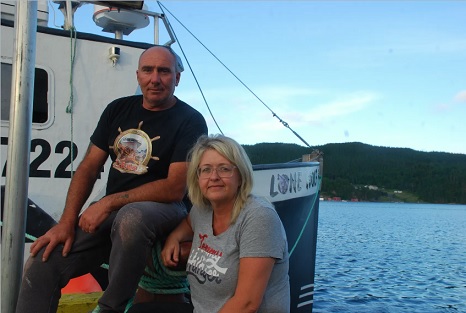
Multi-million dollar capelin fishery is a bust for eastern Newfoundland
The Lone Wolf is lying idle at the wharf in Hickman’s Harbour, Trinity Bay. The only sound is the lap of water against hull, the occasional screech of sea gulls flying past, hunting for food. Earlier this year the Department of Fisheries and Oceans (DFO) set a quota of around 15,000 metric tonnes for fishing zones from the south coast (area 3Ps) to the North East coast (2J, 3K and 3L zones). Inshore licenses, like the one the Marshes have, grant them just 12,000 pounds of crab. “This year we landed $82,000 worth,” she said. And that’s not a whole lot of money to pay a crew and cover the expenses of running a boat. “Last year I could fuel up my boat for $800,” she noted. “This year it costs $1600.” Capelin could have added another $30-40,000 to their seasonal revenue, making it the second most important fishery for their enterprise. But they’re not fishing it. Why not? It’s complicated. >click to read< 11:05

Snow crab prices plummet in Newfoundland
It wasn’t the news fish harvesters in Newfoundland and Labrador wanted to hear. They’ll get less for their snow crab after today, as the result of a decision by the province’s fish price setting panel. After reviewing a request from the Association of Seafood Producers and arguments by the Fish Food and Allied Workers, the panel went with the processors’ pitch of $6.15 per pound. That’s down nearly 20 per cent from the $7.60 per pound price that was set for the start of the season on April 1. In Nova Scotia, fish harvesters also saw a drop in snow crab prices a couple of weeks ago. They are now getting $8.25 a pound for snow crab, according to Gordon Beaton, local president with the Maritime Fishermen’s Union. >click to read< 11:06
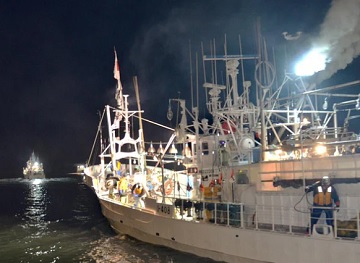
Amid tensions over Ukraine, Russia and Japan seal deal on fishing quotas
Japan and Russia have reached an agreement over Tokyo’s annual catch quota for Russian-born salmon and trout, the Japanese Fisheries Agency said Saturday, despite delays and chilled relations between the two sides amid Russia’s invasion of Ukraine. The agreement on Japan’s quota for the popular fish in waters near disputed islands north of Hokkaido is a relief for Japanese fishermen who were worried about the prospects amid worsening ties between the two governments. >click to read< 08:42
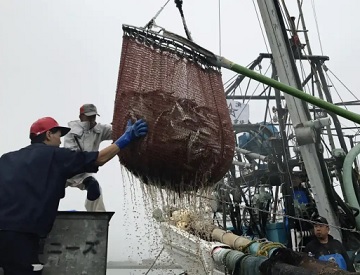
Sanctions threaten to spoil Japan-Russia fishing rights talks
Japan has kicked off annual negotiations with Russia on commercial fishing quotas off the coast of Hokkaido, the Fisheries Agency said Monday, with the talks clouded by Tokyo’s plans to strengthen sanctions over the invasion of Ukraine. The two countries routinely set limits for salmon and sea trout catches in each other’s exclusive economic zones. Fishing season normally begins April 10, but the talks had been delayed by the war. Fishing cannot start until a deal is reached. Closed-door virtual discussions began Monday, according to the Fisheries Agency, with no set end date. >click to read< 16:08
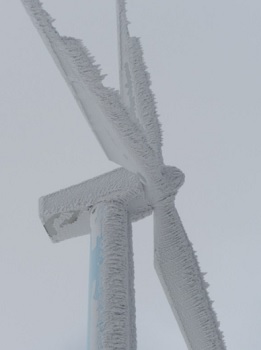
Let Them Freeze: Wind & Solar Generators Couldn’t Care Less About Your Welfare
The wind and solar industries couldn’t care less whether you freeze to death when winter bites across the northern hemisphere and wind and solar output collapse. Solar panels plastered in snow and ice produce nothing; wind turbines frozen solid during breathless, frigid weather produce even less (they actually consume power from the grid to run heating systems meant to prevent their internal workings suffering permanent damage). So, if 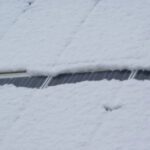 you’re sitting freezing in the dark, don’t expect wind and solar power generators to come to your rescue. No, if the lights and power are on this winter, then you ought to raise a glass for the gas, coal and nuclear power generators separating you and your loved ones from a date with hypothermia and, ultimately, the morgue. >click to read< 11:48
you’re sitting freezing in the dark, don’t expect wind and solar power generators to come to your rescue. No, if the lights and power are on this winter, then you ought to raise a glass for the gas, coal and nuclear power generators separating you and your loved ones from a date with hypothermia and, ultimately, the morgue. >click to read< 11:48
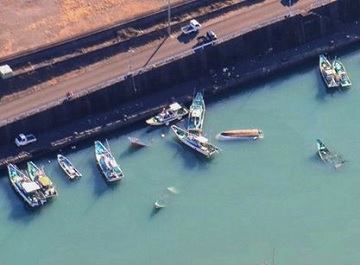
Tsunami: Widespread Fishery Damage from Tonga Eruption Reported across Japan
Fishery damage from a tsunami triggered by the recent eruption of an undersea volcano off the southern Pacific islands of Tonga has been reported in 10 prefectures across Japan, the Fisheries Agency said Friday. The agency is examining the amount of the damage, including the capsizing of fishing boats and the mass death of horse mackerel. >click to read< 08:29
Traditional fishermen in despair over Peru oil spill – Callao, Peru: Hundreds of traditional fisherman living just outside the Peruvian capital fear their livelihoods are ruined following an oil spill caused by a volcanic eruption thousands of miles away. >click to read< 10:31
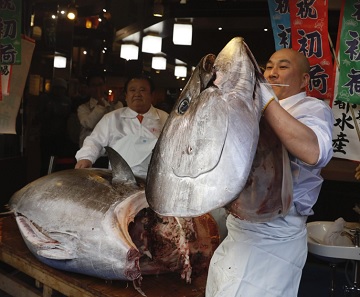
Japan: Bluefin tuna goes for $145,000 as pandemic dampens New Year auction
The top price paid for a tuna at the first auction of the year at Tokyo’s Toyosu fish market fell for the third year running, with demand hit by the pandemic. The first tuna auction of the year at Toyosu market is a closely watched tradition that draws a horde of fish wholesalers every year. Wednesday’s top-priced 465-pound fish was caught off the northern Aomori region of Japan, famous for its quality tuna, and went to Michelin-starred sushi restaurant operator Onodera Group and Japanese wholesaler Yamayuki. The tuna will be offered to customers both in Japan and at the firm’s restaurants abroad, including in Hawaii, New York and Los Angeles,,, >click to read< 14:16






